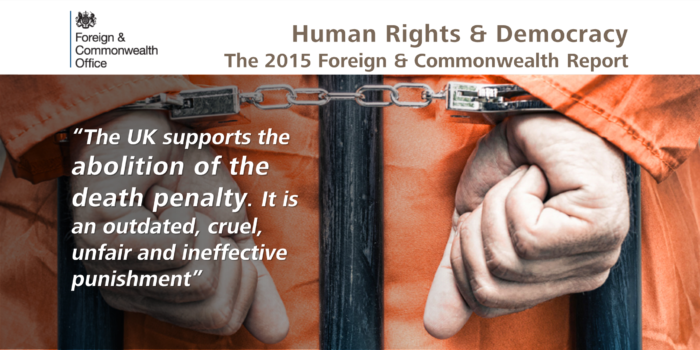29th April 2016
Britain and Human Rights


The Foreign & Commonwealth Office’s Annual Human Rights and Democracy Report was published on 21 April. This report is aimed at increasing awareness of the UK’s role in promoting human rights work overseas, and to encourage countries to uphold and maintain their international human rights record.
The Report lists 30 human rights priority countries: these are the countries where we have the most serious concerns, but it is not an exhaustive list. Our interest in protecting human rights is global.
Some people have suggested that human rights have slipped down the list of priorities for the Foreign Office. This is not correct. What we have done is to take a long careful look at our approach to human rights, consulting widely, and examined where we can make the most impact. We have therefore decided to focus human rights work around three main issues:
- Democratic values and the rule or law;
- Strengthening the rules-based international system;
- Human rights for a stable world.
The Foreign Secretary has instructed us to mainstream human rights work within the Foreign Office. He said: “Human rights should be – and is – the responsibility of all British diplomats”. This means that human rights work will be one of the core elements of our work, integrated into all our other goals. The network now has the freedom to identify locally where we can make the most difference, within these themes, and just do it.
This year’s Annual Human Rights Report is shorter than in previous years, to make it better-focussed, more accessible and user-friendly. It is worth a look.

Yet another human rights issue on which the Holy See is weak, and on which the UK could perhaps encourage improvement, is the lack of the application of the principles of due process in assessing theologians. The Holy See (and a number of Catholic Universities…Jesuitical included) fail to understand, por instance, that due process includes the right to know who makes the accusation). A petition was filed last month by a number of Catholic theologians who had been the object of this human rights violation in processes initiated against their works by the CDF. They generality of lay faithful tend to be unaware of these violations and think it is sinful to denounce bishops, priests, congregations etc. ….we have no effective rights as Catholics.
On a different human rights subject:
Catholics have a right of petition under canon law as in most democratic societies. But Catholics have no means of enforcing the right. Ultimately, what that means is that the Catholic hierarchy has no correlative obligation to reply to a petition and the right of petition of Catholics is, like many of their other “rights and purpored dignities” ineffectual if not inexistent for all intents and purposes.
Would promoting this particular human right come under the scope of Britain’s task of encouraging other UN members (i.e.: the Holy See) to improve their human right’s record?
Further to my previous comment:
The report says that “ensuring equal representation of women in political and public life and challenging discriminatory laws and practices” was a priority for the work carried in 2015….
Sounds wonderful. Will this also be a priority for the UK Embassy in the Holy See for 2016? If that is the case, what concrete actions will be taken to achieve these ends?
It would be wonderful if Britain and other human rights respecting countries could request the Holy See to become a party to CEDAW, the UN Convention for the Elimination of Discrimination against Women. While Catholic women cannot participate on par with men in Church Magisterium and Governance, they are effectively barred from the legislative and governmental functions in their Church.
So refreshing to see Britain stand up for people’s rights so that they do not have to be afraid.